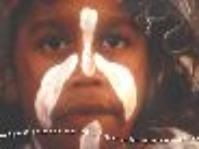The power of kinship
Family groups are extremely important within Aboriginal communities, such as those of the Eora, with each person knowing his or her own place within a complex system of kin relationships which are intrinsically tied to the land. These extended family relationships provide the core of Aboriginal community structures and are central to the way culture and knowledge are passed on, to how law is conveyed and enforced, and society organised.
Kinship defines roles and obligations for raising and educating children - which is the responsibility not only of the parents but of the community as a whole - and provides structures and systems for various forms of sharing, obligation and support within the community.

Elders provide knowledge and guidance to the younger members of the extended family group, forming a bridge to the songs, stories, skills and traditions of the past. Storytelling ensures that the heritage and traditions, culture and art of the community are passed down to younger generations and, as children grow older, more information is passed on to them about their culture.
Adults have a responsibility to pass on the information they learned when they were young. Some information is sacred and can only be passed on to certain people at certain times, for instance only to initiated men or women who have carried out certain initiation rites.
The European concept of the nuclear family holds little currency within Aboriginal culture where the entire community is structured and defined through complex kinship ties. These ties provide the basis for law, society, education, ownership of land, marriage, and social and moral obligations and support within Aboriginal culture.